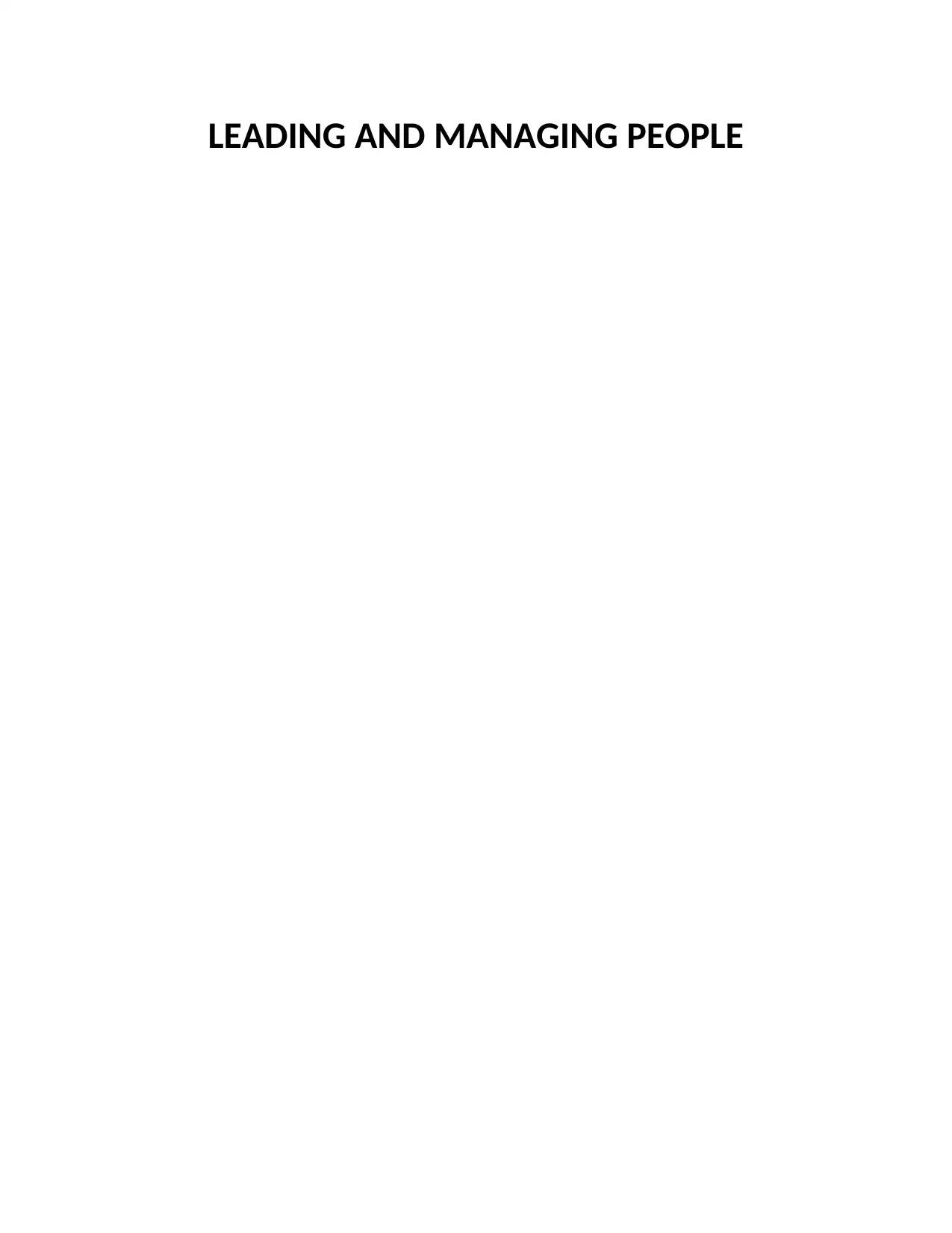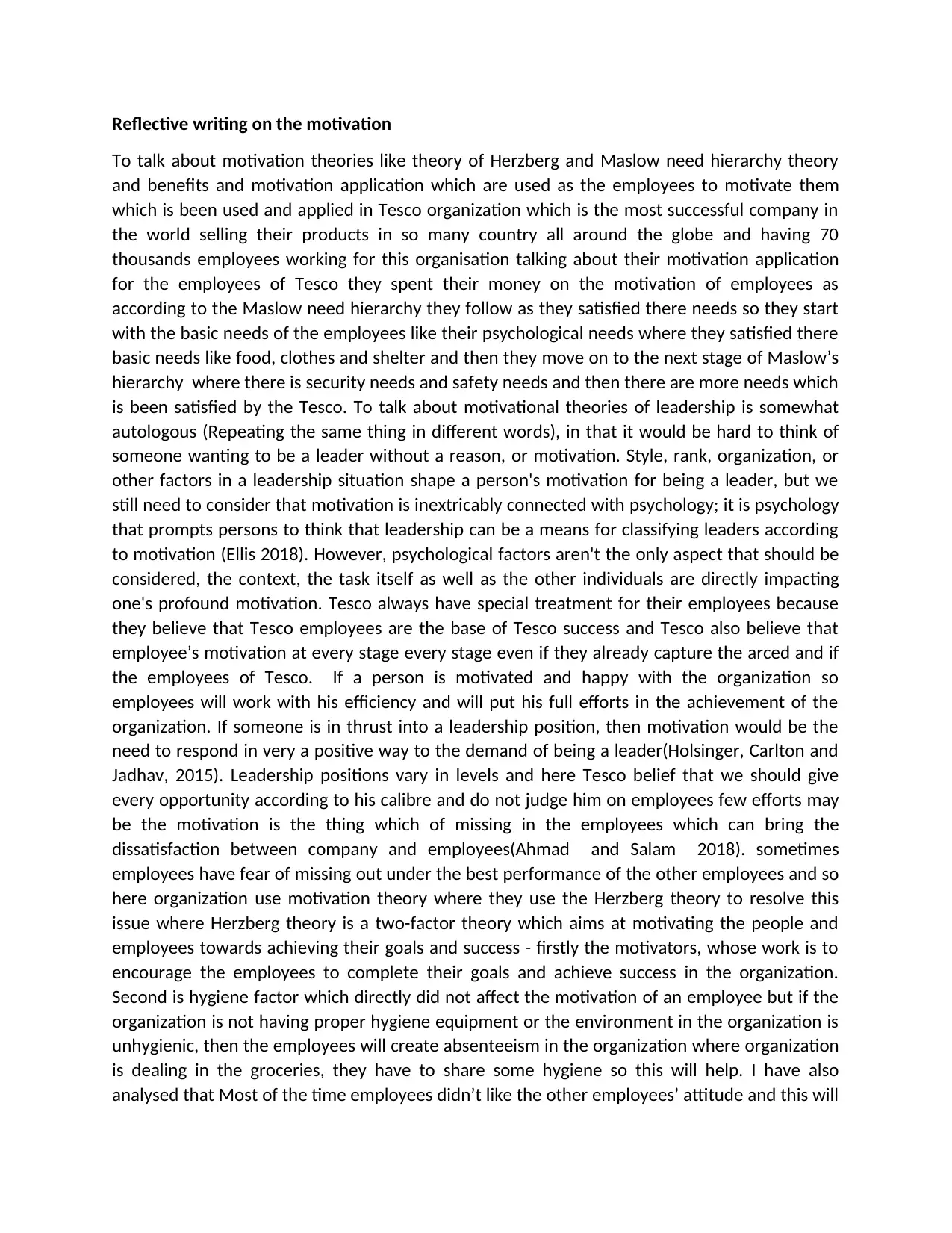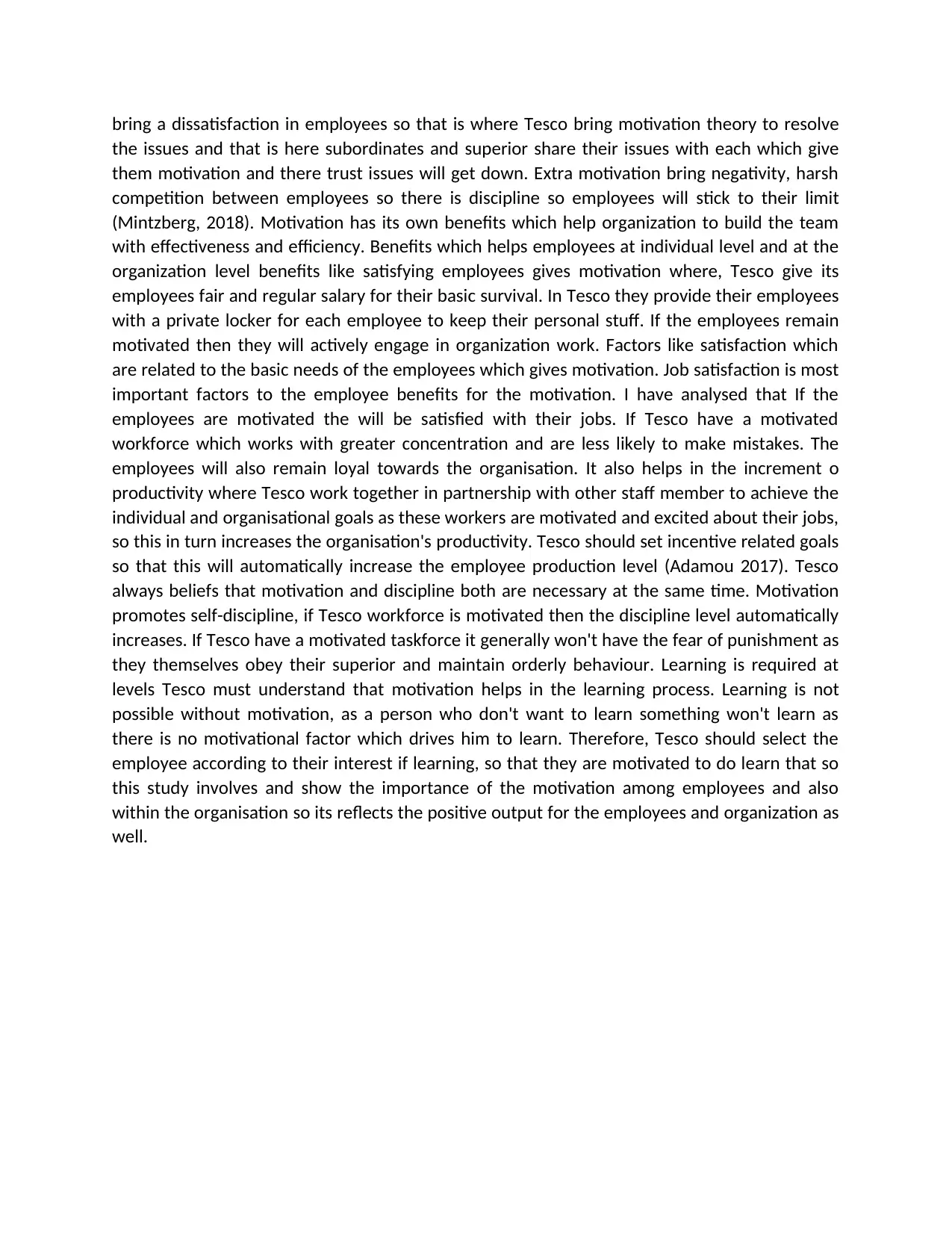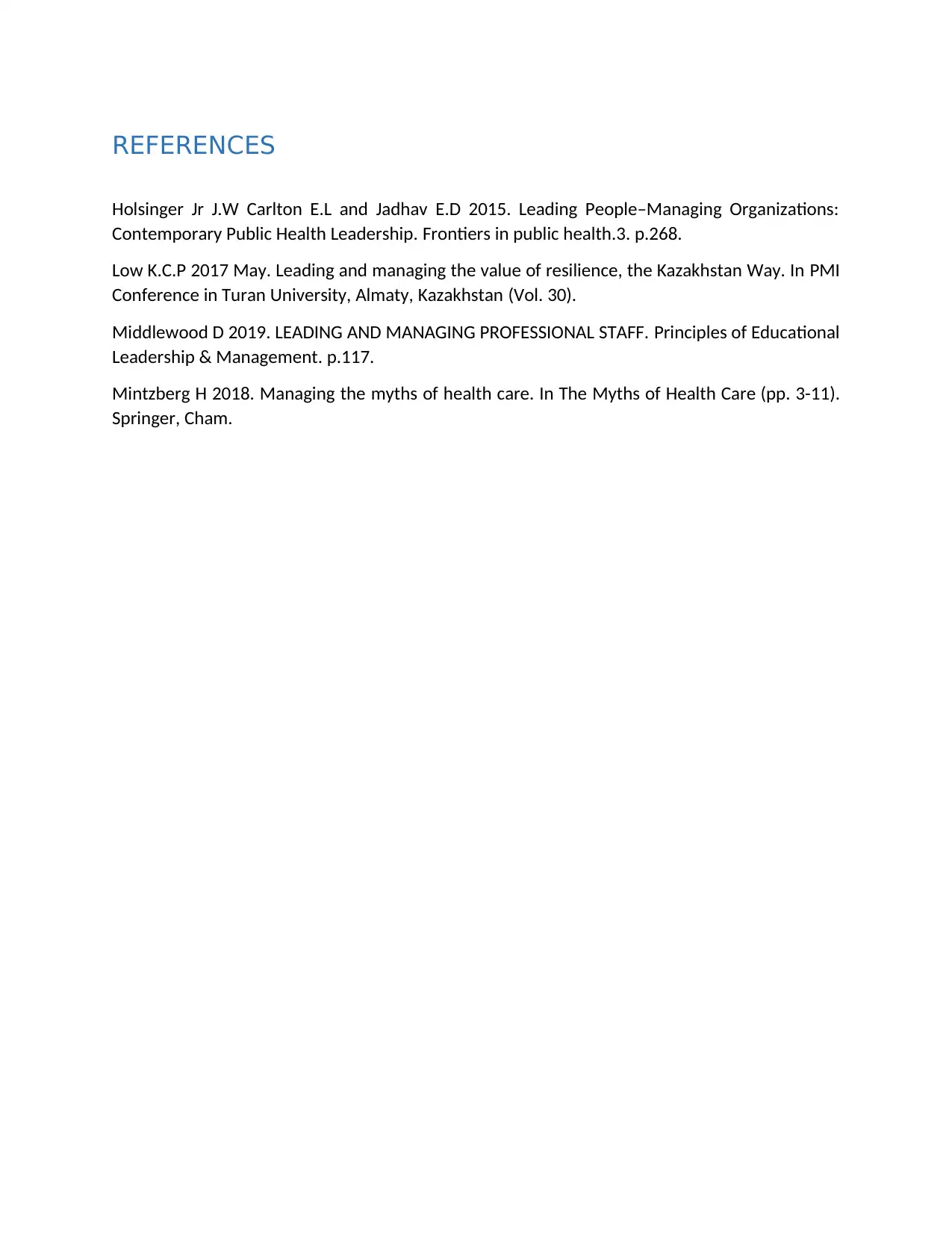Leading and Managing People: Motivation Theories and Tesco's Practices
VerifiedAdded on 2023/01/19
|4
|1202
|82
Essay
AI Summary
This essay delves into the crucial role of motivation in leadership, examining various theories such as Herzberg's two-factor theory and Maslow's hierarchy of needs. It explores how these theories are applied in a real-world context, specifically within the Tesco organization. The essay highlights Tesco's approach to employee motivation, including their investment in meeting employees' psychological and safety needs. It analyzes the benefits of a motivated workforce, such as increased efficiency, productivity, and loyalty. Furthermore, the essay discusses the importance of job satisfaction, setting incentive-related goals, and fostering a disciplined yet motivating work environment. By examining Tesco's practices, the essay underscores the significance of motivation in achieving both individual and organizational goals, emphasizing the positive impact on employees and the company's overall success. The essay also references the importance of learning and how motivation is key to the process.

LEADING AND MANAGING PEOPLE
Paraphrase This Document
Need a fresh take? Get an instant paraphrase of this document with our AI Paraphraser

Reflective writing on the motivation
To talk about motivation theories like theory of Herzberg and Maslow need hierarchy theory
and benefits and motivation application which are used as the employees to motivate them
which is been used and applied in Tesco organization which is the most successful company in
the world selling their products in so many country all around the globe and having 70
thousands employees working for this organisation talking about their motivation application
for the employees of Tesco they spent their money on the motivation of employees as
according to the Maslow need hierarchy they follow as they satisfied there needs so they start
with the basic needs of the employees like their psychological needs where they satisfied there
basic needs like food, clothes and shelter and then they move on to the next stage of Maslow’s
hierarchy where there is security needs and safety needs and then there are more needs which
is been satisfied by the Tesco. To talk about motivational theories of leadership is somewhat
autologous (Repeating the same thing in different words), in that it would be hard to think of
someone wanting to be a leader without a reason, or motivation. Style, rank, organization, or
other factors in a leadership situation shape a person's motivation for being a leader, but we
still need to consider that motivation is inextricably connected with psychology; it is psychology
that prompts persons to think that leadership can be a means for classifying leaders according
to motivation (Ellis 2018). However, psychological factors aren't the only aspect that should be
considered, the context, the task itself as well as the other individuals are directly impacting
one's profound motivation. Tesco always have special treatment for their employees because
they believe that Tesco employees are the base of Tesco success and Tesco also believe that
employee’s motivation at every stage every stage even if they already capture the arced and if
the employees of Tesco. If a person is motivated and happy with the organization so
employees will work with his efficiency and will put his full efforts in the achievement of the
organization. If someone is in thrust into a leadership position, then motivation would be the
need to respond in very a positive way to the demand of being a leader(Holsinger, Carlton and
Jadhav, 2015). Leadership positions vary in levels and here Tesco belief that we should give
every opportunity according to his calibre and do not judge him on employees few efforts may
be the motivation is the thing which of missing in the employees which can bring the
dissatisfaction between company and employees(Ahmad and Salam 2018). sometimes
employees have fear of missing out under the best performance of the other employees and so
here organization use motivation theory where they use the Herzberg theory to resolve this
issue where Herzberg theory is a two-factor theory which aims at motivating the people and
employees towards achieving their goals and success - firstly the motivators, whose work is to
encourage the employees to complete their goals and achieve success in the organization.
Second is hygiene factor which directly did not affect the motivation of an employee but if the
organization is not having proper hygiene equipment or the environment in the organization is
unhygienic, then the employees will create absenteeism in the organization where organization
is dealing in the groceries, they have to share some hygiene so this will help. I have also
analysed that Most of the time employees didn’t like the other employees’ attitude and this will
To talk about motivation theories like theory of Herzberg and Maslow need hierarchy theory
and benefits and motivation application which are used as the employees to motivate them
which is been used and applied in Tesco organization which is the most successful company in
the world selling their products in so many country all around the globe and having 70
thousands employees working for this organisation talking about their motivation application
for the employees of Tesco they spent their money on the motivation of employees as
according to the Maslow need hierarchy they follow as they satisfied there needs so they start
with the basic needs of the employees like their psychological needs where they satisfied there
basic needs like food, clothes and shelter and then they move on to the next stage of Maslow’s
hierarchy where there is security needs and safety needs and then there are more needs which
is been satisfied by the Tesco. To talk about motivational theories of leadership is somewhat
autologous (Repeating the same thing in different words), in that it would be hard to think of
someone wanting to be a leader without a reason, or motivation. Style, rank, organization, or
other factors in a leadership situation shape a person's motivation for being a leader, but we
still need to consider that motivation is inextricably connected with psychology; it is psychology
that prompts persons to think that leadership can be a means for classifying leaders according
to motivation (Ellis 2018). However, psychological factors aren't the only aspect that should be
considered, the context, the task itself as well as the other individuals are directly impacting
one's profound motivation. Tesco always have special treatment for their employees because
they believe that Tesco employees are the base of Tesco success and Tesco also believe that
employee’s motivation at every stage every stage even if they already capture the arced and if
the employees of Tesco. If a person is motivated and happy with the organization so
employees will work with his efficiency and will put his full efforts in the achievement of the
organization. If someone is in thrust into a leadership position, then motivation would be the
need to respond in very a positive way to the demand of being a leader(Holsinger, Carlton and
Jadhav, 2015). Leadership positions vary in levels and here Tesco belief that we should give
every opportunity according to his calibre and do not judge him on employees few efforts may
be the motivation is the thing which of missing in the employees which can bring the
dissatisfaction between company and employees(Ahmad and Salam 2018). sometimes
employees have fear of missing out under the best performance of the other employees and so
here organization use motivation theory where they use the Herzberg theory to resolve this
issue where Herzberg theory is a two-factor theory which aims at motivating the people and
employees towards achieving their goals and success - firstly the motivators, whose work is to
encourage the employees to complete their goals and achieve success in the organization.
Second is hygiene factor which directly did not affect the motivation of an employee but if the
organization is not having proper hygiene equipment or the environment in the organization is
unhygienic, then the employees will create absenteeism in the organization where organization
is dealing in the groceries, they have to share some hygiene so this will help. I have also
analysed that Most of the time employees didn’t like the other employees’ attitude and this will

bring a dissatisfaction in employees so that is where Tesco bring motivation theory to resolve
the issues and that is here subordinates and superior share their issues with each which give
them motivation and there trust issues will get down. Extra motivation bring negativity, harsh
competition between employees so there is discipline so employees will stick to their limit
(Mintzberg, 2018). Motivation has its own benefits which help organization to build the team
with effectiveness and efficiency. Benefits which helps employees at individual level and at the
organization level benefits like satisfying employees gives motivation where, Tesco give its
employees fair and regular salary for their basic survival. In Tesco they provide their employees
with a private locker for each employee to keep their personal stuff. If the employees remain
motivated then they will actively engage in organization work. Factors like satisfaction which
are related to the basic needs of the employees which gives motivation. Job satisfaction is most
important factors to the employee benefits for the motivation. I have analysed that If the
employees are motivated the will be satisfied with their jobs. If Tesco have a motivated
workforce which works with greater concentration and are less likely to make mistakes. The
employees will also remain loyal towards the organisation. It also helps in the increment o
productivity where Tesco work together in partnership with other staff member to achieve the
individual and organisational goals as these workers are motivated and excited about their jobs,
so this in turn increases the organisation's productivity. Tesco should set incentive related goals
so that this will automatically increase the employee production level (Adamou 2017). Tesco
always beliefs that motivation and discipline both are necessary at the same time. Motivation
promotes self-discipline, if Tesco workforce is motivated then the discipline level automatically
increases. If Tesco have a motivated taskforce it generally won't have the fear of punishment as
they themselves obey their superior and maintain orderly behaviour. Learning is required at
levels Tesco must understand that motivation helps in the learning process. Learning is not
possible without motivation, as a person who don't want to learn something won't learn as
there is no motivational factor which drives him to learn. Therefore, Tesco should select the
employee according to their interest if learning, so that they are motivated to do learn that so
this study involves and show the importance of the motivation among employees and also
within the organisation so its reflects the positive output for the employees and organization as
well.
the issues and that is here subordinates and superior share their issues with each which give
them motivation and there trust issues will get down. Extra motivation bring negativity, harsh
competition between employees so there is discipline so employees will stick to their limit
(Mintzberg, 2018). Motivation has its own benefits which help organization to build the team
with effectiveness and efficiency. Benefits which helps employees at individual level and at the
organization level benefits like satisfying employees gives motivation where, Tesco give its
employees fair and regular salary for their basic survival. In Tesco they provide their employees
with a private locker for each employee to keep their personal stuff. If the employees remain
motivated then they will actively engage in organization work. Factors like satisfaction which
are related to the basic needs of the employees which gives motivation. Job satisfaction is most
important factors to the employee benefits for the motivation. I have analysed that If the
employees are motivated the will be satisfied with their jobs. If Tesco have a motivated
workforce which works with greater concentration and are less likely to make mistakes. The
employees will also remain loyal towards the organisation. It also helps in the increment o
productivity where Tesco work together in partnership with other staff member to achieve the
individual and organisational goals as these workers are motivated and excited about their jobs,
so this in turn increases the organisation's productivity. Tesco should set incentive related goals
so that this will automatically increase the employee production level (Adamou 2017). Tesco
always beliefs that motivation and discipline both are necessary at the same time. Motivation
promotes self-discipline, if Tesco workforce is motivated then the discipline level automatically
increases. If Tesco have a motivated taskforce it generally won't have the fear of punishment as
they themselves obey their superior and maintain orderly behaviour. Learning is required at
levels Tesco must understand that motivation helps in the learning process. Learning is not
possible without motivation, as a person who don't want to learn something won't learn as
there is no motivational factor which drives him to learn. Therefore, Tesco should select the
employee according to their interest if learning, so that they are motivated to do learn that so
this study involves and show the importance of the motivation among employees and also
within the organisation so its reflects the positive output for the employees and organization as
well.
⊘ This is a preview!⊘
Do you want full access?
Subscribe today to unlock all pages.

Trusted by 1+ million students worldwide

REFERENCES
Holsinger Jr J.W Carlton E.L and Jadhav E.D 2015. Leading People–Managing Organizations:
Contemporary Public Health Leadership. Frontiers in public health.3. p.268.
Low K.C.P 2017 May. Leading and managing the value of resilience, the Kazakhstan Way. In PMI
Conference in Turan University, Almaty, Kazakhstan (Vol. 30).
Middlewood D 2019. LEADING AND MANAGING PROFESSIONAL STAFF. Principles of Educational
Leadership & Management. p.117.
Mintzberg H 2018. Managing the myths of health care. In The Myths of Health Care (pp. 3-11).
Springer, Cham.
Holsinger Jr J.W Carlton E.L and Jadhav E.D 2015. Leading People–Managing Organizations:
Contemporary Public Health Leadership. Frontiers in public health.3. p.268.
Low K.C.P 2017 May. Leading and managing the value of resilience, the Kazakhstan Way. In PMI
Conference in Turan University, Almaty, Kazakhstan (Vol. 30).
Middlewood D 2019. LEADING AND MANAGING PROFESSIONAL STAFF. Principles of Educational
Leadership & Management. p.117.
Mintzberg H 2018. Managing the myths of health care. In The Myths of Health Care (pp. 3-11).
Springer, Cham.
1 out of 4
Related Documents
Your All-in-One AI-Powered Toolkit for Academic Success.
+13062052269
info@desklib.com
Available 24*7 on WhatsApp / Email
![[object Object]](/_next/static/media/star-bottom.7253800d.svg)
Unlock your academic potential
Copyright © 2020–2025 A2Z Services. All Rights Reserved. Developed and managed by ZUCOL.





